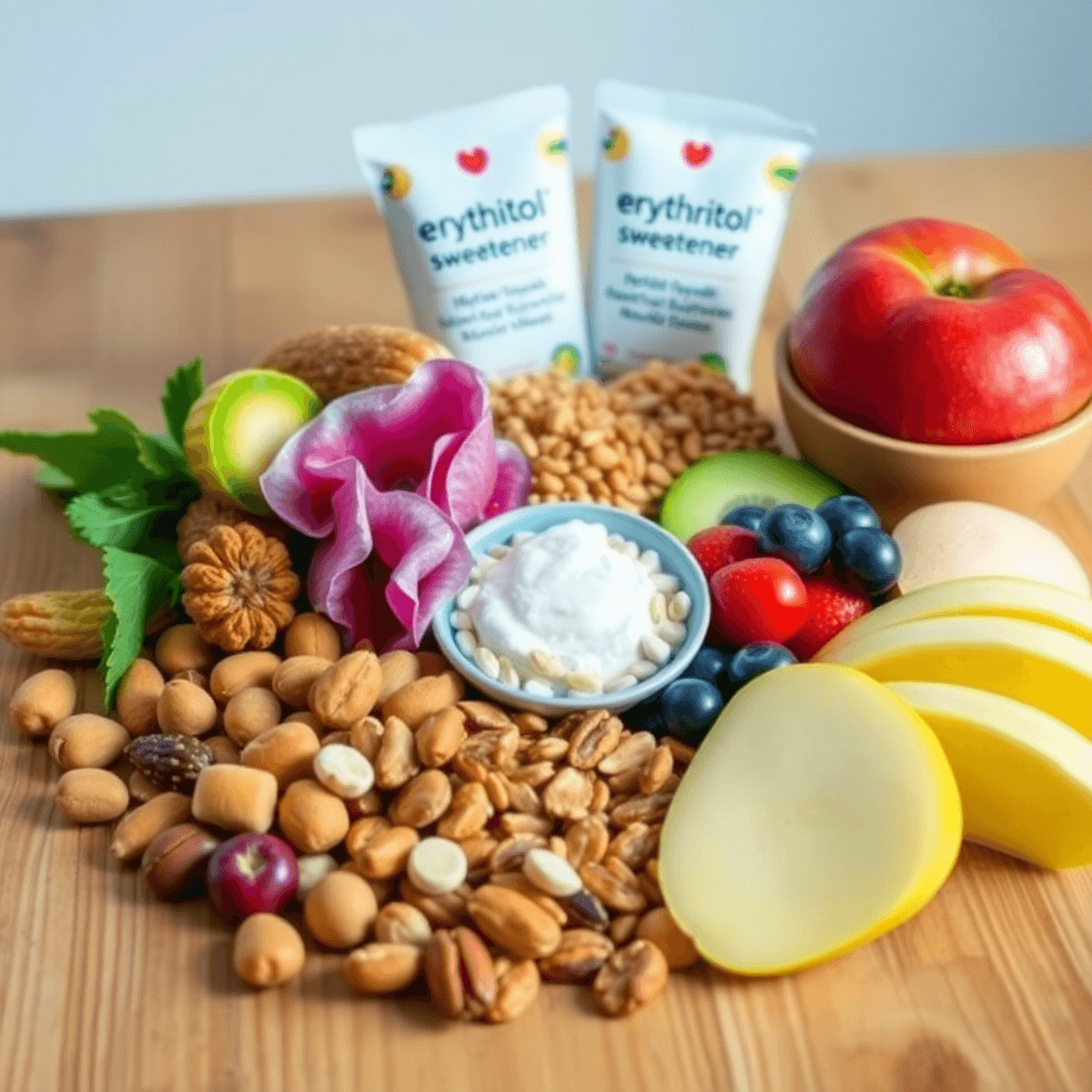Why Compromise is Strength: How to Choose Healthier Snacks
When you hear the word "compromise" in relation to food choices, what comes to mind? Many of us associate it with sacrifice, restriction, or giving up something we love. Let's flip this perspective – choosing health-first treats and no sugar snacks isn't about loss; it's about gaining strength, vitality, and control over our well-being.
Selecting Healthier Snacks as Self-Empowerment
Think of selecting healthier snacks as an act of self-empowerment. Each time you reach for a sugar-free cookie or a nutrient-rich alternative like our Keto-friendly almond cookies, you're making a conscious decision to invest in your health. These choices create ripples of positive impact:
- Sustained energy throughout your day
- Better blood sugar control
- Improved mood stability
- Enhanced mental clarity
- Long-term health benefits
The Impact of Snack Choices on Health
Your snack choices shape not just your present moment but your future health journey. By embracing health-first treats, you're not compromising – you're choosing strength. This mindset shift transforms every snack decision into an opportunity to nurture your body and mind.
Understanding the Empowered Perspective on Snack Choices
Many people view choosing healthier snacks as a form of deprivation - giving up the foods they love for less satisfying alternatives. This mindset creates unnecessary resistance and emotional strain around food choices.
Let's reframe this perspective:
- Choosing rather than sacrificing
- Gaining health benefits instead of losing enjoyment
- Empowering yourself through informed decisions
When you select a sugar-free cake, you're not compromising - you're making an empowered choice that aligns with your wellbeing goals. This shift in perspective transforms "I can't have that" into "I choose this."
Self-control isn't about restriction - it's about liberation. Each mindful snack choice strengthens your ability to:
- Make decisions that serve your long-term health
- Break free from impulsive eating patterns
- Build sustainable healthy habits
Research shows people who view healthy eating as a positive choice rather than a sacrifice experience:
- Greater satisfaction with their food choices
- Reduced feelings of deprivation
- Improved long-term adherence to healthy eating habits
This empowered perspective puts you in control of your snacking decisions, creating a positive relationship with food that supports both physical health and emotional wellbeing.
Incorporating more fiber into your diet can be particularly beneficial, especially during periods like Ramadan when managing diabetes becomes crucial. Here are some surprising ways fiber can support diabetes control.
Moreover, adopting a low-carb diet can be a really smart idea for your overall health.
The Science Behind Making Healthier Snack Choices
Research from the Journal of Consumer Research reveals a direct link between clear nutritional labeling and improved snack choices. When consumers understand what's in their food, they make smarter decisions. A study tracking 2,500 participants showed a 23% reduction in high-calorie snack purchases when detailed nutritional information was prominently displayed.
Here's what science tells us about informed snacking:
- Blood Sugar Control: Conscious snack choices help maintain steady blood glucose levels, reducing energy crashes and mood swings. This is particularly important when considering the impact of sugar on our health. For instance, understanding more about sugar-free substitutes like erythritol can help consumers make better choices.

- Appetite Regulation: Nutrient-dense snacks increase satiety, leading to better portion control throughout the day
- Metabolic Benefits: Research indicates that selecting low-glycemic snacks can boost metabolism by up to 10%
The numbers speak for themselves:
- People who read food labels consume 200-300 fewer calories daily
- Sodium intake decreases by approximately 400mg when nutritional information guides choices
- Regular label readers maintain healthier body weights long-term
A groundbreaking study in Preventive Medicine demonstrated that individuals who consistently check nutrition facts are twice as likely to meet their daily nutritional requirements. These findings reinforce the power of knowledge in making health-conscious decisions.
The brain's reward centers actually adapt to healthier choices over time. Neuroimaging studies show increased activation in pleasure-related areas when consuming nutritious snacks after consistent healthy eating patterns.
Lastly, it's vital to note that not all sugar substitutes are created equal. Understanding the science behind zero-sugar sweeteners can provide valuable insights into their effects on health and metabolism.
Exploring Health-First Treats: Examples and Benefits
Health-first treats offer delicious alternatives that nourish both body and mind. Let's explore some popular categories:

Sugar-Free Delights
- Dark chocolate with stevia
- Almond flour cookies
- Berry-based desserts
- Natural peanut butter cups
Low-Carb Favorites
- Cheese crisps
- Zucchini chips
- Coconut clusters
- Keto-friendly bars
These alternatives pack powerful benefits beyond simple calorie reduction. Sugar-free treats help stabilize blood sugar levels, reducing energy crashes and mood swings. Low-carb snacks support sustained energy release while keeping insulin levels balanced.
The mental benefits shine through as well. Choosing health-first treats creates a positive relationship with food, reducing guilt and anxiety around snacking. These alternatives allow you to enjoy sweet moments while honoring your body's needs.
Many health-first treats offer bonus nutrition. For instance, almond flour cookies provide protein and healthy fats, while berry-based desserts deliver antioxidants. Dark chocolate contains flavonoids that support heart health and cognitive function.
Your taste buds adapt quickly to these better choices. Many people report enhanced taste sensitivity after reducing processed sugars, leading to greater appreciation of natural sweetness in fruits and other whole foods.
The Role of Food Parenting Practices in Fostering Healthy Snack Habits
Structured food parenting creates lasting impacts on children's snacking preferences. Parents who model healthy eating behaviors naturally inspire their children to make similar choices. Research shows children are 3x more likely to choose nutritious snacks when they regularly see their parents enjoying these options.
Here's what effective food parenting looks like in practice:
- Keep healthy snacks visible and accessible
- Create positive associations with nutritious foods
- Involve kids in grocery shopping and meal prep, which not only helps them learn about food but also fosters a sense of responsibility
- Avoid using treats as rewards or punishment
The same principles work for adults learning to reshape their snacking habits. A structured approach to snack choices - like pre-portioning healthy chips or keeping cut vegetables ready - makes nutritious options the easy default.
Parents can transform their home food environment by:
- Stocking kitchen counters with fresh fruit
- Storing processed snacks out of sight
- Making homemade versions of favorite treats
- Setting regular snack times
These intentional practices build natural preferences for wholesome foods that last well beyond childhood.
When it comes to snack options, parents can opt for healthier alternatives like sugar-free Motichoor Ladoo made with pure ghee, or sugar-free coconut cookies which are diabetic-friendly and keto-friendly. These options not only cater to health needs but also align with a sustainable lifestyle, proving that we can indulge in delicious treats while still being mindful of our health and the environment.
Practical Tips for Embracing a Health-First Snacking Mindset
Making healthier snack choices becomes second nature with these practical strategies:
Plan Your Snacks: Keep a stash of pre-portioned healthy snacks in your bag, car, or desk drawer. This prevents impulsive choices when hunger strikes.
Master Label Reading:
- Check serving sizes first
- Look for added sugars
- Compare sodium content
- Identify hidden unhealthy fats
Practice Portion Control:
- Use small containers
- Pre-measure snacks
- Avoid eating straight from packages
Create Smart Combinations:
- Pair protein with fiber
- Mix textures for satisfaction
- Balance sweet and savory
These delicious treats are perfect for those following a keto or diabetic-friendly diet.
- Strategic Shopping:
- Shop with a list
- Avoid hunger shopping
- Stay in perimeter aisles
- Choose whole food options
These habits transform snacking from mindless munching into intentional nourishment. Your body recognizes quality fuel, responding with sustained energy and improved focus throughout the day.
Conclusion
Choosing health-first treats isn't about restriction - it's about empowerment. Each mindful snack choice represents a step toward better well-being and demonstrates your commitment to self-care. You're not giving up anything; you're gaining control, energy, and vitality.
Remember: Your food choices shape your health story. By embracing nutritious alternatives and viewing them through a lens of strength rather than sacrifice, you create lasting positive changes. This mindset shift transforms simple snacking decisions into powerful acts of self-love.
You hold the power to make choices that serve your well-being. Let each health-conscious snack selection be a reminder of your strength, wisdom, and dedication to living your best life.
In addition to making healthier food choices, incorporating technology like smart scales and wearables can further enhance your journey towards better health. These tools help you manage aspects of your health beyond just weight loss, providing valuable insights that can assist in conditions such as diabetes.
Disclaimer: The information provided in this article is for informational purposes only and should not be considered as medical advice. It is always recommended to consult with a healthcare professional before making any significant changes to your diet or exercise routine.
FAQs
1.What does it mean to reframe 'compromise' as a strength in choosing health-first treats?
Reframing 'compromise' as a strength involves viewing the choice of health-first treats over indulgent snacks not as a sad sacrifice, but as a smart and empowering decision that prioritizes well-being and long-term health benefits.
2.How can adopting an empowered perspective change my mindset about snack choices?
Shifting to an empowered perspective means replacing negative views of compromise with positive ones, recognizing self-control and prioritizing your health. This mindset helps you see choosing sugar-free or low-calorie snacks as a proactive step towards better well-being rather than deprivation.
3.What role does food labeling play in making healthier snack decisions?
Clear nutritional information on food labels enables informed choices by highlighting calorie content, sodium levels, and sugar presence. Understanding these details helps individuals select healthier snacks that align with their health goals, such as sugar-free cookies or low-carb options.
4.Can you provide examples of health-first treats and their benefits?
Health-first treats include sugar-free snacks, low-calorie options, and low-carb snacks like sugar-free cookies and healthy chips. These treats support both physical and mental well-being by reducing sugar intake, managing calorie consumption, and promoting sustained energy levels.
5.How do food parenting practices influence healthy snacking habits in children?
Structured food parenting practices, like modeling healthy eating and offering nutritious foods consistently, help children develop preferences for wholesome snacks. This intentional approach fosters lifelong habits that prioritize health and empower better snack choices.


